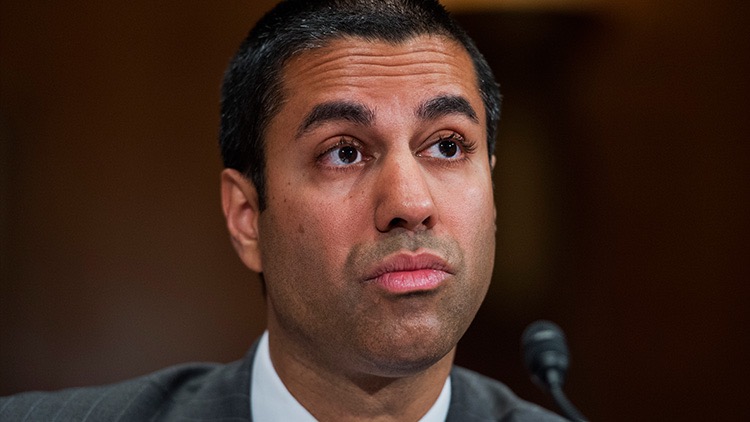FCC's Pai Putting Economic Analysis Front and Center

The smarter way to stay on top of broadcasting and cable industry. Sign up below
You are now subscribed
Your newsletter sign-up was successful
FCC chairman Ajit Pai argued the case Wednesday for why the FCC has lost its data-driven, economic analysis edge and laid out a plan for honing it once more.
That was in a speech to the Hudson Institute in Washington, according to a copy supplied by his office, where Pai said he would be creating an Office of Economics and Data (OED) that would combine economists and others from around the commission and provide input on rulemakings, transactions, auctions, data management, research and more.
He said his goal is to have the office up and running by the end of the year, after a task force of economists had been dispatched to ponder "Who should be part of this office? Who should be on other teams? How should OED be structured and how should it fit with the rest of the Commission? What should be the powers and responsibilities of the office?"
He said the OED's role would be to provide early input on decisionmaking, better manage data and reports, vet paperwork requirements to make sure they are necessary, and provide strategic, long-term thinking into process. They will also ponder the more cosmic regulatory questions, including: "What’s the economic value of federal spectrum? What’s the commercial value of unlicensed, and does it depend on the band? What’s the impact of high-band spectrum on low-band spectrum policy, and on the mix of licensed and unlicensed spectrum?"
"We intend to restore the tradition of staff economists spending time thinking about the future and publishing in the present influential white papers that keep us from being stuck in the past," Pai told his audience. "We need bright people who can focus on big-picture, out-of-the-box thinking. The FCC’s history shows how truly valuable this can be for the agency, and ultimately, for the American people."
Pai said that while the FCC has first-rate economists, including the ones who helped design the recent reverse spectrum auction, they are not always used "optimally," at a "serious" opportunity cost to the public.
Pai said the principal problems have been fourfold: 1) they are not systematically included in policy work; 2) they work in "siloes," with economists in one bureau busy and in another not so much. "In a converged marketplace, economists with expertise in one context may be able to contribute significantly to addressing problems in another," he said; 3) "cost-benefit analysis has been largely ignored"; and 4) the FCC has often used data poorly, and has overcollected data that is duplicative or unnecessary.
The smarter way to stay on top of broadcasting and cable industry. Sign up below
On point number four, Pai pointed out that while the FCC has collected a boatload of data on the wireless market, it has failed to use it to determine if that marketplace is effectively competitive.
At the speech, Pai was introduced by the only economist ever to hold an FCC commission seat, Harold Furchtgott-Roth. On being introduced by Furchtgott-Roth, Pai quipped: "This is like Bruce Springsteen bringing a garage band onstage to cover 'Born to Run.'"
Fellow Republican commissioner Michael O'Rielly assocated himself with Pai's effort.
“The Chairman’s implementation of a key proposal from the new Administration’s Transition Team is laudable and consistent with my calls for similar action," he said. "This important structural change will help unite agency economists and bring greater efficiency, cohesion, and consistency to their work. Over the longer term, binding cost-benefit analysis will provide a stronger foundation for agency decisions and ensure any burdens imposed by the Commission are truly justified.”
“For far too long, terms like ‘regulatory flexibility analysis’ and ‘paperwork reduction’ have been treated as rote parts of FCC procedure,” said Shirley Bloomfield, CEO of NTCA The Rural Broadband Association. “We are therefore delighted to see Chairman Pai place a greater emphasis on meaningful economic analysis as part of FCC policymaking. Our small business members are eager for implementation of changes such as those suggested by Chairman Pai, as they offer the promise of better scoping of requirements and reports, along with a better foundation for substantive decision-making.”
“Good policymaking rests on a foundation of sound economic analysis and it will help consumers by encouraging competition and market-driven results," said USTelecom CEO Jonathan Spalter. "We commend Chairman Pai for making economic analysis a priority again at the agency.”
Contributing editor John Eggerton has been an editor and/or writer on media regulation, legislation and policy for over four decades, including covering the FCC, FTC, Congress, the major media trade associations, and the federal courts. In addition to Multichannel News and Broadcasting + Cable, his work has appeared in Radio World, TV Technology, TV Fax, This Week in Consumer Electronics, Variety and the Encyclopedia Britannica.

